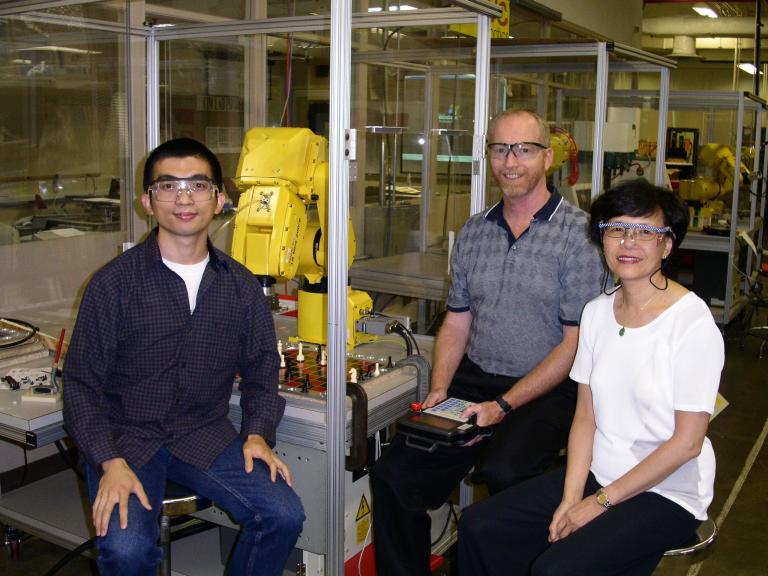
For those who think an electrical engineer does work unrelated to what a mechanical engineer does, think again. Today, companies realize that to successfully bring products to market, integration of engineering professionals and disciplines is key.
This was the message in the summer meeting of Kettering University's Industrial Advisory Committee for the Vertical and Horizontal Integration of Manufacturing courses in engineering curricula. The idea was to bring together cooperative education partner companies to examine current engineering curricula to determine how students from different engineering disciplines can work together in an interdisciplinary way. The goal: "to reduce the time it takes to bring products to market," explained Dr. Lucy King, professor of Manufacturing Engineering at Kettering. "It used to take a company about five years to bring products like new cars to market given the complex, individual nature of certain engineering functions," she said. "Eventually, this time decreased to three years as companies incorporated more integrated engineering processes into the design and manufacturing operations. Today, depending on the product, it takes 18 months. We want to decrease this time further, and our advisory members think this is something that Kettering can help with through current engineering curricula and integrated course work."
During the meeting, the advisory committee considered the following questions:
- Is it important to integrate manufacturing concepts with design and quality courses into engineering curricula?
- Does Kettering's Manufacturing Engineering program address current industry trends and are there additional industrial concepts that Kettering should include?
- What industrial involvement can cooperative and advisory committee partners provide student projects and classroom strategies?
King said that Kettering is in a rarified position with industry because companies need engineers trained in interdisciplinary approaches when it comes to product development and production. She, Dr. Jacqueline El-Sayed and Dr. Tony Lin have achieved success in this activity by combining the efforts of King's IME-408 Robotics class with El-Sayed's MECH-312 Machine Design class, and King's IME-409 CIM course with Lin's IME-333 Design of Experiments. Students in these classes work together on a specific project by budgeting, designing and manufacturing a prototype tool. This project was also supported in 2003 by a National Science Foundation (NSF) grant.
For students, the project is challenging and revealed the need to work with people from diverse engineering backgrounds, a practice that is becoming more and more common in industry. King said representatives from companies emphasized how important it is to engage students in these kinds of integrated exercises before they graduate from school. "Some companies feel this activity teaches teamwork and conflict resolution in a corporate environment," King noted, "while other companies are specifically looking for professionals who can conduct themselves in an interdisciplinary meeting regarding a team project."
For Kettering University, integrating different engineering disciplines on projects is achievable through current courses, which means that the institution does not need to create a new class. Integration initiatives such as those by King, El-Sayed and Lin teach students how to work with other engineers and business professionals, which accomplish the goals companies have when hiring new professionals.
And on a grander scale, this kind of integration activity could eventually lead to less outsourcing of U.S. production and a discussion of how it fits in the current initiative "Save Your Factory." This endeavor, initiated by Fanuc Robotics America Inc., works to dissuade North American manufacturers from moving production to offshore sites. According to "Save Your Factory" by Mike Sutton published in the April 1, 2005, issue of "Wards Auto World," Fanuc executives believe automation of production facilities could help reduce and one day eliminate the outsourcing of production work to other countries.
Rick Schneider, president and CEO of Fanuc Robotics North America, believes automation and incorporation of robotics in current production facilities can increase production, improve quality and keep costs low enough to make North American manufacturing viable. Although labor costs overseas are cheap, there are considerable shipping delays, long-distance quality issues, communication problems and current fluctuations that could render off shore production less cost efficient than previously assumed.
Experience with cross disciplinary integrated engineering activities is a major factor for job readiness when companies seek highly skilled, educated and trained engineering professionals. "It also plays a significant role in the Save Your Factories initiative because displaced workers can undergo retraining in automation, which means retaining a good percentage of jobs in the U.S.," King concluded.
Written by Gary J. Erwin
810-762-9538
gerwin@kettering.edu
Companies and Individuals Attending the Meeting
Industry Partners
- Richard Johnson, general manager of Material Handling Systems at Fanuc Robotics Inc.;
- Roderick Johnson, vice president of Operations for Fernco Inc.;
- Blaise Klenow, director of Vehicle Manufacturing Information Technology Management;
- Pat Lynch, sales engineer at Gerotech Inc.;
- William Russo, director of Manufacturing Engineering for Ford Motor Co.; Robert Skodzinski, president of Gerotech Inc.; and
- Kevin Rong, associate professor of Manufacturing Engineering and director of the CIM Lab at Worcester Polytechnic Institute.
Kettering University Representatives
- Dr. John Lorenz, provost and vice president of Academic Affairs;
- James Hamilton, chief information officer;
- Arlene Hunt, director of Sponsored Research;
- Dr. David Poock, department head of the IME dept.;
- Dr. Joel Berry, department head of the Mechanical Engineering Dept.;
- Dr. Lucy King, professor of Manufacturing Engineering;
- Dr. Jacqueline El-Sayed, associate professor of Mechanical Engineering;
- Dr. Tony Lin, professor of Industrial Engineering;
- Dr. Matt Sanders, associate professor of Industrial Engineering; and
- Dr. Mohamed El-Sayed, professor of Manufacturing Engineering.